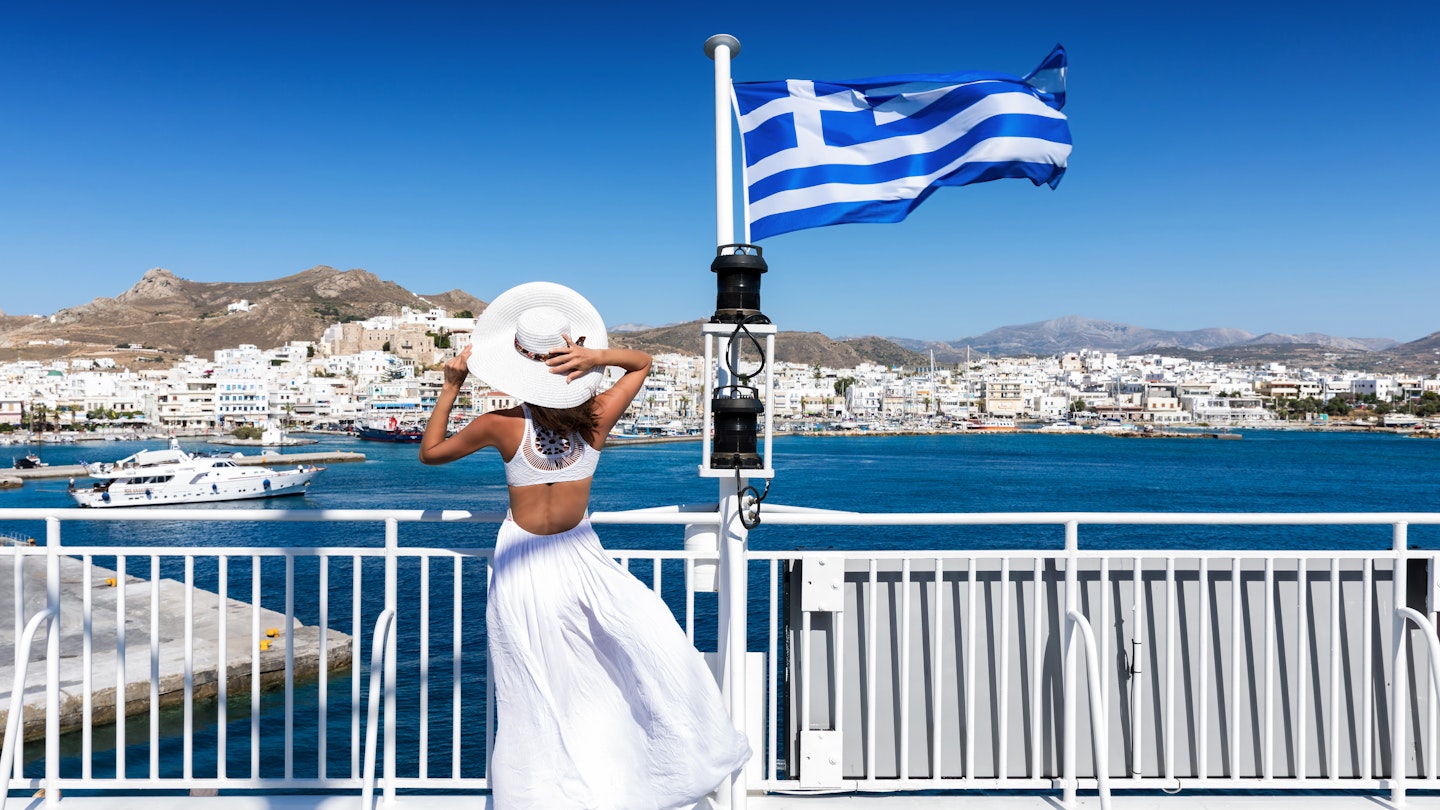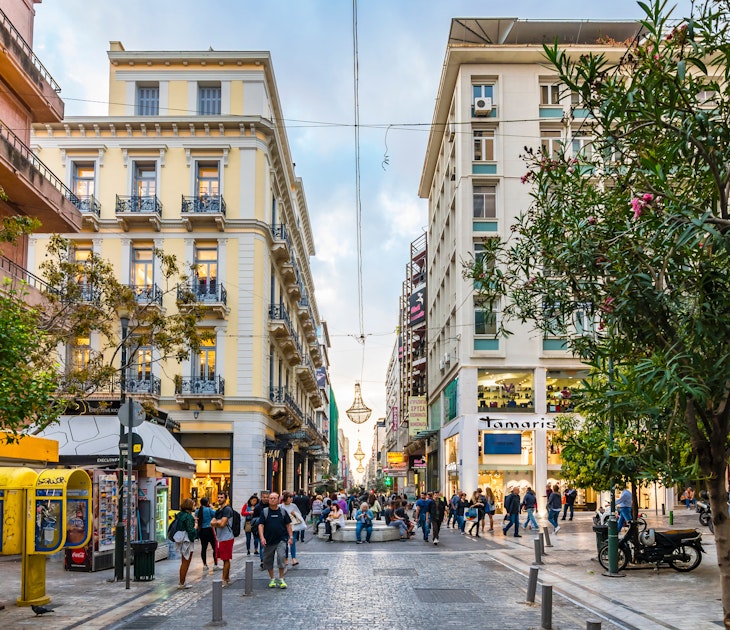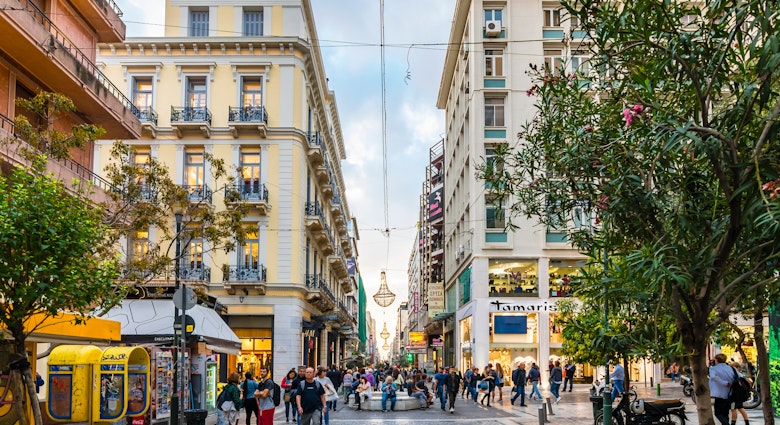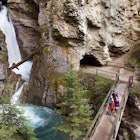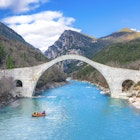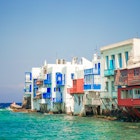Think of travel in Greece, and your mind may wander to images of ferries cruising across the turquoise Aegean Sea.
Taking to the water is essential if you plan to hop between the Greek islands, but there are plenty of other ways to traverse Greece’s amazing landscapes, including planes, trains, buses and – if you have the leg power – bicycles. Here’s our guide to getting around in Greece.
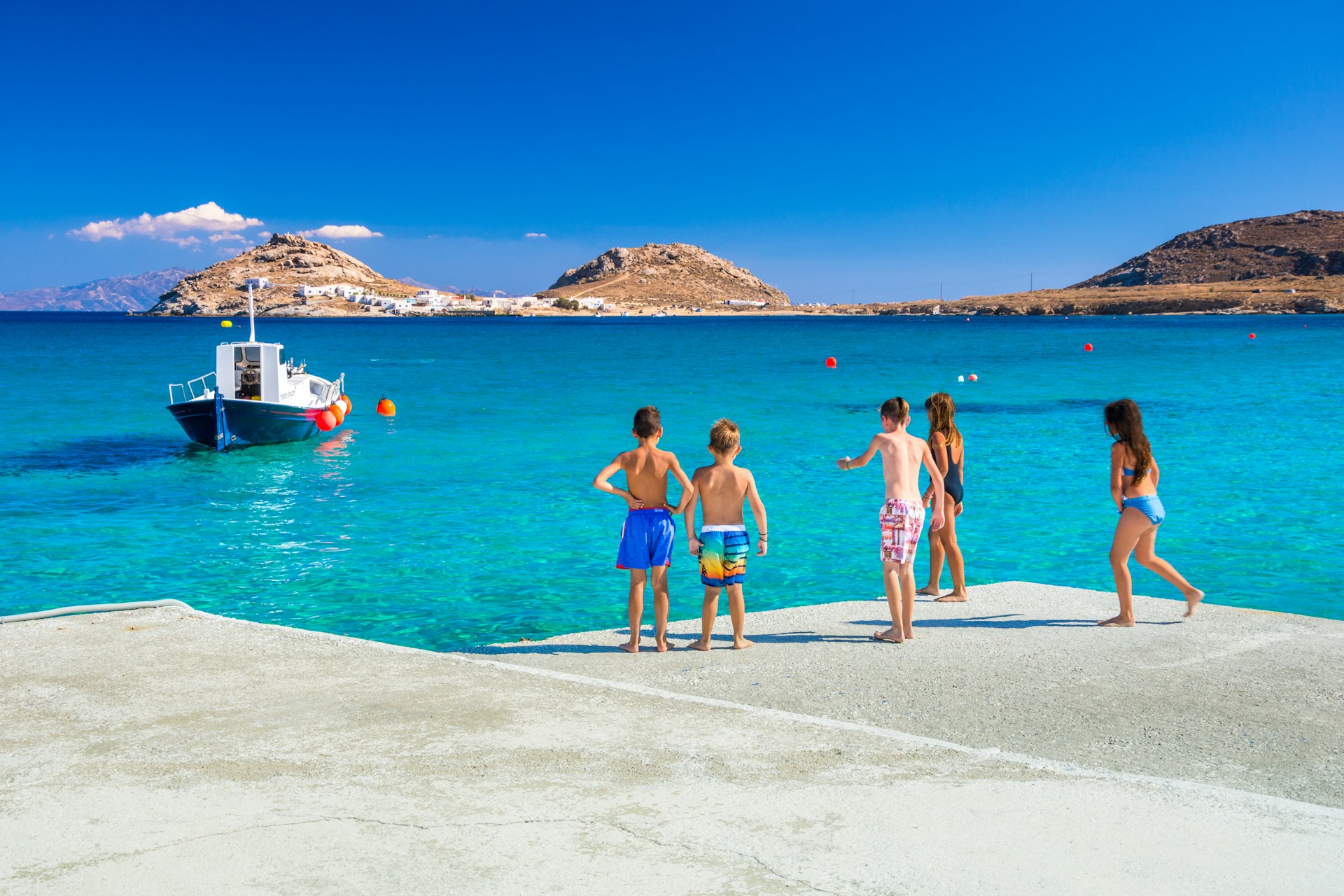
Cruise to Greek islands by boat in summer (and winter)
Nothing says traveling in Greece quite like standing on the deck of an inter-island ferry with the warm sun on your face. Ferries are the classic way to traverse Greece's 227 islands, with myriad connections linking islands and the mainland during the summer months. The Greek ferry network is comprehensive, so it's easy to island-hop almost at will.
The boats going between the islands include fast car ferries, slower traditional boats, sleek catamarans and spidery hydrofoils known as "flying dolphins." Larger boats on overnight services have cabins in various sizes, and all but the very smallest boats serve food. Large restaurants are common on the big car ferries.
Safety precautions mean that boats can be delayed or postponed because of high winds and storms. Occasional worker strikes can also cause havoc. In the summer months, ferries run frequently on most routes, so you can hop from one island to another with ease.
In winter, schedules are much more limited, although services to Athens (and its port at Piraeus) usually run year-round, and there are often boats serving major islands. From November to April, services between the smaller islands in the Aegean can be nonexistent.
How to find the best ferry fares in Greece
Fares are usually affordable. It's worth shopping around on popular routes where various companies compete; slower boats are usually cheaper. Check general ferry booking websites such as Ferryhopper as well as the websites of individual ferry companies for deals.
On larger boats, your fare may only guarantee space on deck or inside in a crowded public lounge. At busy times, it's worth paying extra for a guaranteed seat (usually similar to a large airline-style seat), access to a separate lounge with upgraded comforts or an overnight cabin.
Services and the companies that run them can change greatly each year, and summer timetables are not announced until just before the start of the peak travel season. Major companies include Anek Lines, Blue Star Ferries, Golden Star Ferries, Hellenic Seaways and Minoan Lines.
Local tip: High-speed car ferries often have limited outside deck space or none at all, so if the idea of sunning yourself on deck while you glide past beguiling islands is part of your Greek fantasy, choose the slower, traditional boats.
Check for deals when flying domestically in Greece
The country's de facto national carrier, Aegean Airlines, and its regional subsidiary, Olympic Air, handle the vast majority of domestic flights. Greece also has several smaller airlines, including Sky Express, providing competition on major routes, as well as vital links between smaller islands.
Fares for domestic routes tend to be cheap, but the cheapest seats sell out early, especially on weekends, when Greeks travel in droves from Athens to the islands. Because of quirks in government subsidies, it can be significantly cheaper to book each segment of your itinerary separately, as opposed to building a single ticket covering all your connections.

Take the train to get across the Greek mainland
The railway network in Greece is operated by Hellenic Train (renamed from OSE in 2021), and while the network is limited, trains are an enjoyable and relaxing way to explore important portions of the Greek mainland.
Greece has two types of train service: regular (slow) trains that stop at all stations, and faster intercity (IC) trains that link major cities. Train fares are comparable with the rest of Europe, and the carriages of intercity trains are quite comfortable, with a cafe-bar on board.
The main line from Athens to Thessaloniki has been greatly improved after years of work. Several daily services on high-speed trains link the two cities in a little over four hours. This line continues north to Alexandroupoli and Dikea in the northeast, with connections to Florina and the Pelion Peninsula. Another line heads north across the border with North Macedonia and on to Belgrade and central Europe.
The Peloponnese network from Athens runs only as far west as Kiato, with bus services to Plata for ferry connections. There are a few minor services elsewhere on the peninsula, such as the short line from Pyrgos to Olympia.
Travel far on Greece's wide-ranging bus network
Greek buses are cheap and convenient, and the network is extensive. Most buses on the mainland and the islands are operated by regional collectives operating under the umbrella of KTEL. Each KTEL collective independently operates services within its region and runs buses to the main towns of other prefectures.
Major towns usually have daily services to nearby cities and, on the mainland, a daily service to Athens. Smaller towns and villages usually have a daily bus service of some sort, although remote areas may see only one or two buses a week. These buses operate for the benefit of people going to town to shop rather than for tourists, and they typically leave the villages very early in the morning and return early in the afternoon.
Many big cities – including Athens, Iraklio, Patra and Thessaloniki – have more than one bus station, each serving different regions. Make sure you find the correct station for your destination. In smaller towns and villages, the "bus station" may be no more than a bus stop outside a kafeneio (coffee house) or taverna (restaurant) that doubles as a booking office.
KTEL buses are modern and air-conditioned. You can board a bus without a ticket and pay onboard, but a seat is not guaranteed. On popular routes and/or during high season, you may have to stand.
Planning tip: As a rule of thumb, try to turn up for your bus around 20 minutes before departure.

Go off the beaten track in a car, but be wary of traffic
Having your own car will give you the freedom to get off the beaten track and explore Greece at your own pace. The road network is decent, although there are few highways, so the going can be slow. Regular car-ferry services go to almost all islands, so a car is not an impediment to island-hopping.
In cities and on popular islands, summertime congestion is a significant problem. Parking and traffic woes can quickly ruin a carefree vacation. Also note that some rural sights and beaches can only be reached by rough, dirt tracks. You may not be covered for damage that happens on dirt roads on a standard car rental policy.
When it comes to picking a car rental company, the big multinational agencies can be found in Athens and other major towns and at most airports. On the islands, local companies may offer better rates. You can always rent a car for just a day of exploration, avoiding the hassle of dealing with a car for your entire trip.
Local tip: Like airfares, rental rates are cheapest when reserved far in advance. In August, the entire supply of rental vehicles on some islands can be booked out.
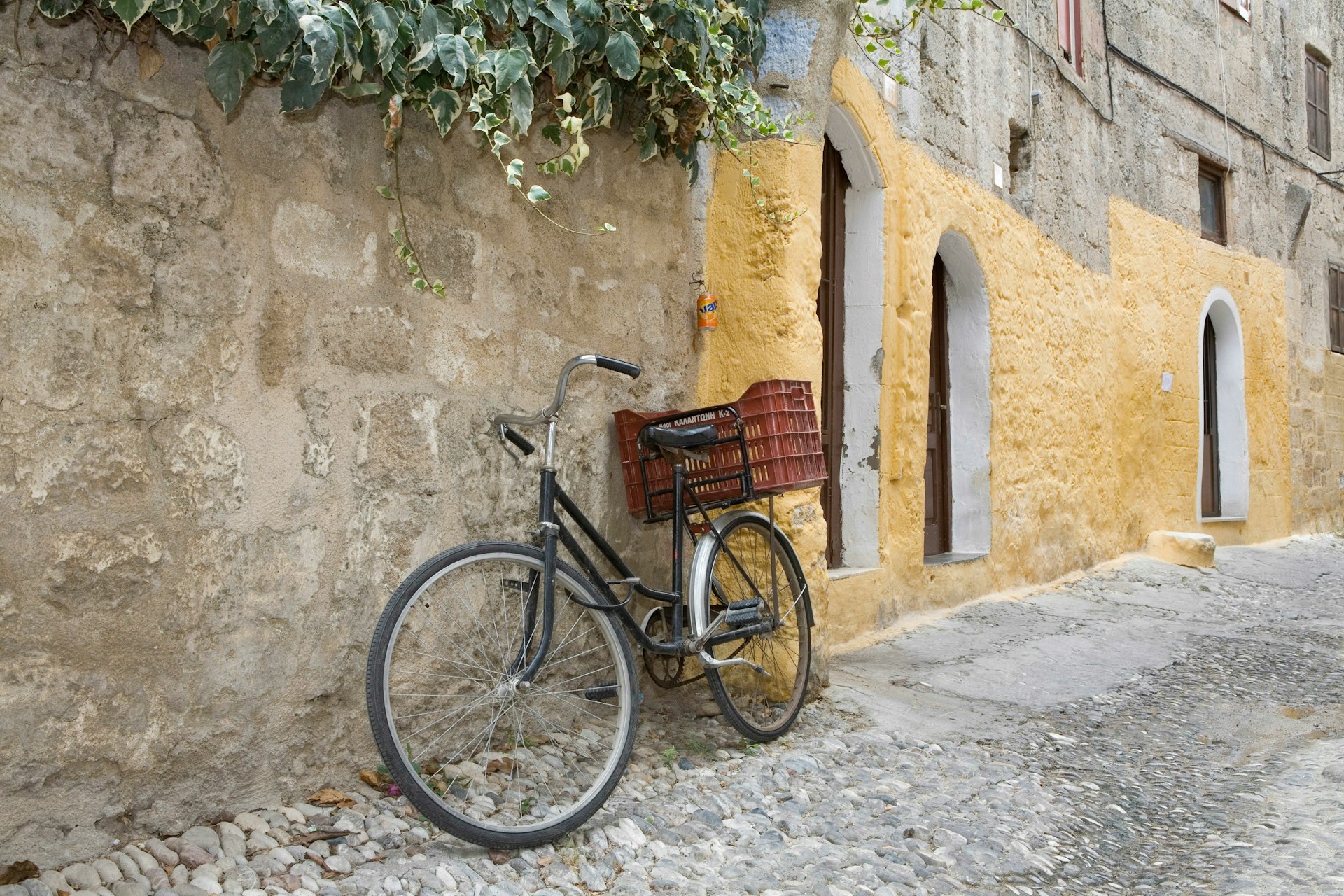
Build up your leg muscles on a bike ride around Greece
Cycling in Greece is growing in popularity, best done in spring or fall rather than high summer. Strong leg muscles are a must to tackle the mountains, or you can stick to some of the flatter coastal routes. Flatter islands such as Kos are bicycle-friendly, but others such as Santorini have such steep and perilous roads that cycling is not recommended (or enjoyable).
Overall, cycling infrastructure around Greece leaves something to be desired. Bike lanes are rare to nonexistent, and there is a real danger from speeding cars – driven by locals and tourists alike.
Bicycles may be carried for free on some ferries, while on others, there may be a fee, or they may not be allowed at all because of a lack of space on board.
You can rent bicycles in most tourist hangouts, but they are not as widely available as cars and motorcycles. Prices range from €10 to €20 per day, depending on the type of bike. Always make sure the rental cost includes the use of a helmet.
Accessible transportation in Greece
Access for travelers with disabilities is best in Athens, where there are many accessible sights, hotels and restaurants. Much of the rest of Greece, with its abundance of uneven stones, worn marble, slippery cobbles and stepped alleys, remains inaccessible or difficult for people with reduced mobility.
This said, many modern resorts are fully accessible, and some public beaches have ramps across the sand for wheelchair users. The government has committed to making many more beaches accessible in the coming years. Flights, ferries and trains also make an effort to accommodate people with accessibility needs. Buses often do not.
Good resources for accessible travel in Greece include Travel Guide to Greece and Accessible Greece, which provide links to local information and resorts and tours catering to tourists with physical disabilities. For more information, download Lonely Planet’s Accessible Travel guide.
